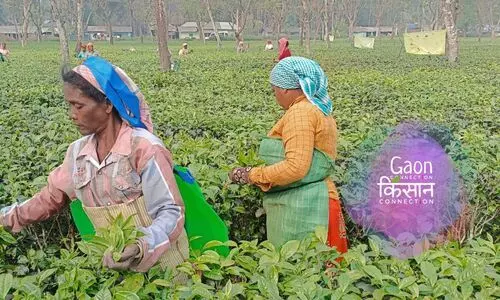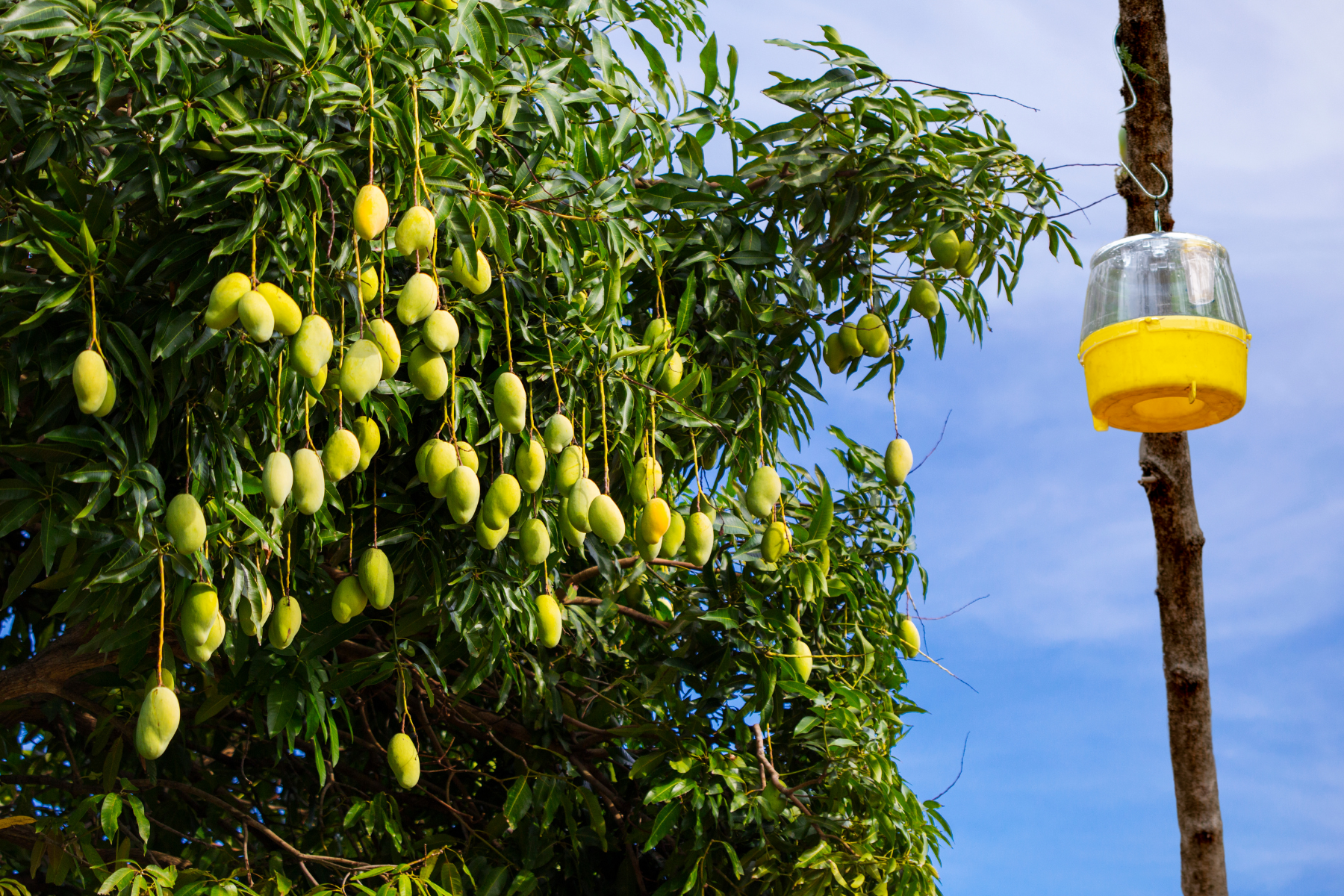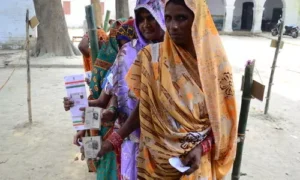The aroma and flavours of Darjeeling tea are world famous and so are its picturesque tea gardens that were set up during the British Raj days. With a surge in demand for tea that is organically grown, tea planters in Darjeeling and other parts of North Bengal are moving away from the use of chemical fertilisers in tea cultivation.
Majherdabri estate which has 327 hectares under tea, is one such. With an annual production of 950,000 metric tonnes, the tea estate has launched its organic tea brand called Dabri.
“We were using chemical fertilisers for several years, and this has affected the quality of soil and the yield of tea,” Chinmoy Dhar, general manager of Majherdabri tea estate in Alipuduar district of West Bengal, told Gaon Connection. “There has been a shift in the wants of the customers as they become more health conscious. We are switching to organic tea as more and more international buyers prefer certified organic produce,” he said.
But switching to organic tea is coming with its own set of challenges for the tea growers of north Bengal, who complain that the yields are falling and the initial input cost has increased. Vagaries of weather are further adding to their worries.
According to the Tea Board, in North Bengal, there are 87 tea gardens in Darjeeling and all of them are organic and produce Darjeeling tea, while plains have 449 gardens that produce Crush Tear Curl (CTC) tea. In the plains only two gardens have obtained certificates of being completely organic.
“It takes at least three years to turn completely organic, during which time no chemical pesticides can be used. The production comes down by 30-40 per cent and the cost per kilo of production rises by Rs 20-30 in the case of plains, and almost Rs 50 higher in Darjeeling as it takes additional cost to transport organic material to hills,” Sumon Majumder, general manager, marketing, Poddar HMP Group, told Gaon Connection. This group owns the Namring Tea Estate in Darjeeling, which is organic.
India is the second largest producer of tea globally. From 1325.05 million kilogrammes (kg) in 2017-18, tea production has jumped to 1344.4 million kg in 2021-22. After Assam, West Bengal is the second highest tea producing state in the country.
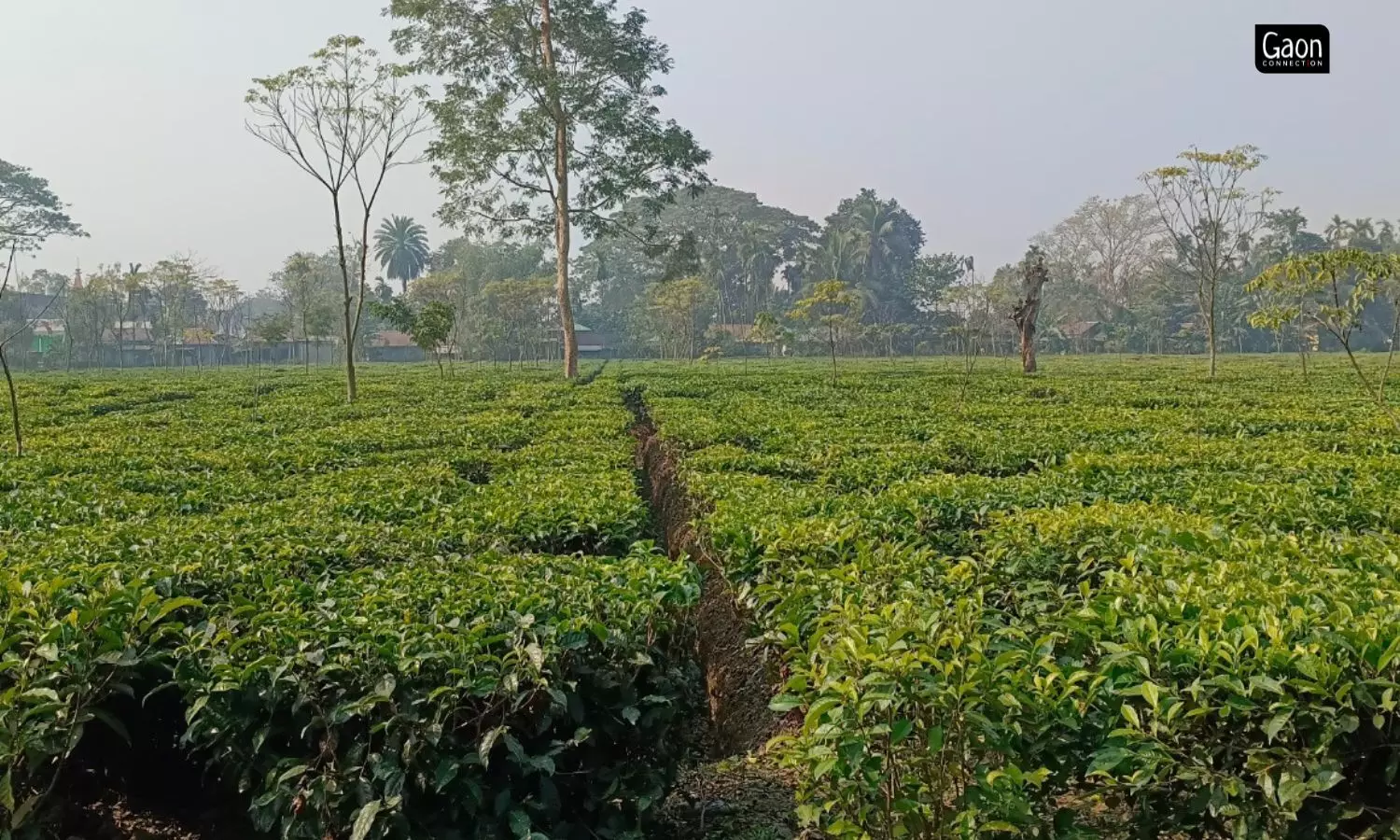
According to the Tea Board, in North Bengal, there are 87 tea gardens in Darjeeling and all of them are organic and produce Darjeeling tea.
According to Harisadhan Malakar, senior soil scientist, Tocklai Tea Research Institute, Jorhat, Assam, North Bengal has 536 tea gardens out of which 449 are located in the plains that produce CTC tea, and the rest are in the hills growing what is broadly referred to as the premium Darjeeling tea, which is mostly exported.
Total organic tea produced in India is around 11.07 million kg. Of this West Bengal produces around 4.9 million kg. In the last fiscal year (2021-22), West Bengal produced around 163 million kg of tea in all.
Switching over to organic
“We now spray organic pest repellents such as neem leaves mixed with cow urine, cow dung and molasses. This is good for the soil as it helps it to breathe and increases its life-cycle. But, we have to be extra cautious and keep a close watch,” said Dhar.
“Chemical fertilisers have a fixed cycle and have to be sprayed after a certain interval but organic fertilisers have to be used whenever there is a pest attack. The production also declines by 25 per cent during the switchover,” the general manager of Majherdabri tea estate said.
Tea experts agree that switch-over to organic production raises the cost and brings down yield.
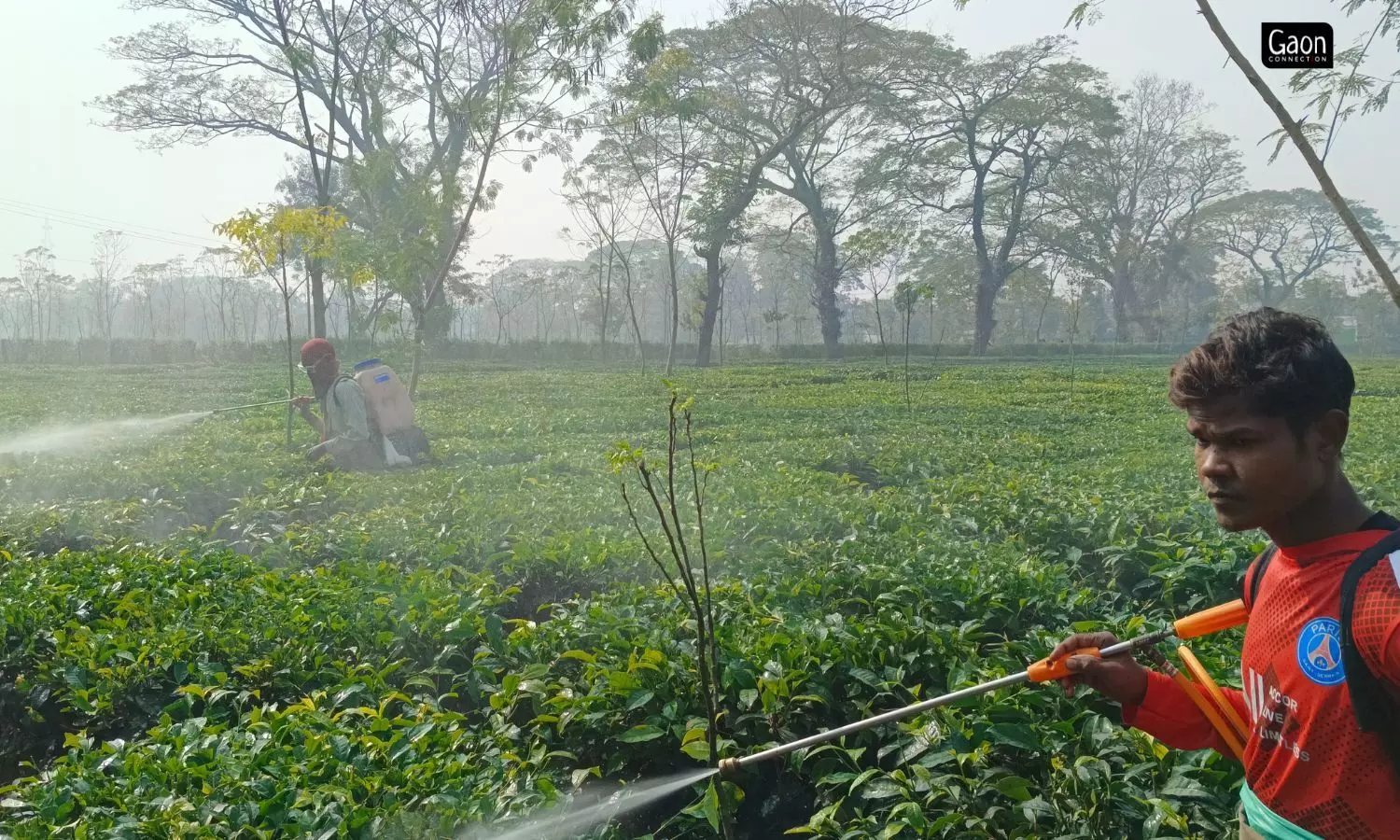
The input cost is higher in inorganic tea cultivation because of high volume and use of costly agro-chemicals.
“It takes about three to five years for the garden to turn completely organic after fulfilling the terms and conditions as set by the organic certified agency,” senior soil scientist Malakar, from the Tocklai Tea Research Institute, Jorhat, Assam, told Gaon Connection. He said that the production of tea drops about 30-50 per cent initially before getting established as organic. “The production decline rate also depends upon agro-climatic region, variety, management practices etc,” Malakar added.
Also Read: Teatime in Kishanganj
The input cost is higher in inorganic tea cultivation because of high volume and use of costly agro-chemicals. Organic tea cultivation on the other hand may have lesser yield but it has lesser input expenses It is also priced nearly 30 to 40 per cent more than inorganic tea.
“Darjeeling tea is much in demand in foreign countries especially in Russia, Iran and Germany and switching to organic has been getting producers much higher prices,” Malakar said.
“If the government supports the cultivation of organic tea by ensuring sectors such as the railways, government offices, the military, etc, use organic tea, it would go a long way. This would encourage more gardens to make a switchover, and the chemical-free tea is good for the consumers in the country too,” Malakar pointed out.
A tea estate manager, on condition of anonymity, said that the organic pesticides and fertilisers that were approved by the tea board under Plant Protection Code (PPC) were not effective. “The plants have developed a resistance towards it and something has to be done to enhance the performance of the organic alternative,” he said.
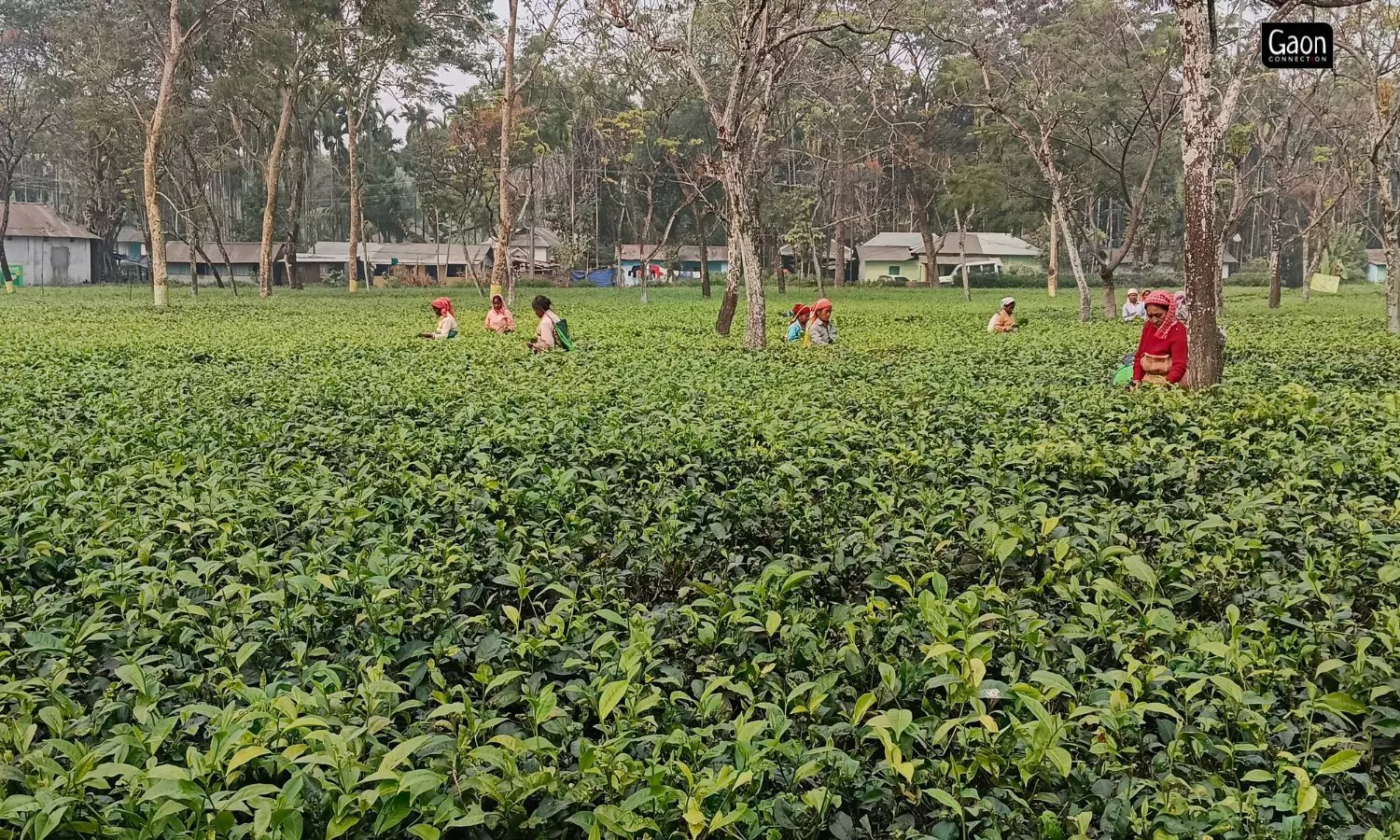
West Bengal is the second highest tea producing state in the country.
“A majority of the PPC listed insecticides are showing tolerance or are non effective against helopeltis theivora (a tea mosquito bug) in Upper Assam and Central Dooars tea plantation area,” Somnath Roy, senior entomologist, Tocklai Tea Research Institute (TTRI), Jorhat, Assam, told Gaon Connection. In some places in central Dooars, pesticides such as hexaconazole showed less effectiveness,” he added.
According to tea industry sources, the matter is being looked into and talks are on with researchers to come up with more effective organic pesticides.
Also Read: Globally Famous Darjeeling Tea At Risk From Climate Change
Climate change affecting tea production
As it is with any other cultivation, tea cultivation is facing the impact of erratic weather and climate change. “We are facing severe losses due to climate change. Earlier, the months of March, April and May were dry and with no rains that was conducive to tea production, but lately, it has been raining in these months that has affected the quality and quantity of tea,” Rajiv Gupta, a senior manager at Ambari tea estate in Alipurduar district, told Gaon Connection.
Researchers say that fluctuations in climate and soil variables like temperature, precipitation have a strong effect on Doars tea production, “Our analysis show that maximum and minimum increase in monthly average temperature beyond a certain threshold affects the tea,” Piyashee Mallik, former Phd scholar at School of Oceanographic studies, Jadavpur University told Gaon Connection.
“Greater monthly rainfall hampers rain flush in Doars region. Increase in surface net solar radiation during summer leads to decreased dry matter production and photo-inhibition in tea plants thereby reducing yield. During monsoons, the combination of a wetter and warmer conditions show a detrimental effect on Doars tea yield,” Mallik said.

Darjeeling tea is much in demand in foreign countries especially in Russia, Iran and Germany and switching to organic has been getting producers much higher prices.
The vagaries of weather have affected the cycle of plucking the tea too, he said. “There is a mandatory cooling off period between December and February, where no tea plucking is allowed, as per the tea board directives,” Gupta pointed out. The time is used for maintenance and pruning of the tea, relaying and repair of water lines and so on.
Also Read: COVID-19 lockdown, erratic rainfall: Small tea growers of Assam suffer major losses
According to tea industry sources, this is called the ‘Winter Dormancy’ period. It is when the day’s length reduces to 11.5 hours which is not considered conducive to plucking of tea leaves as it would not fetch good quality tea.
“But, there is still nearly 80 kgs of tea in our garden still waiting to be plucked. This was not so even a decade ago,” Gupta pointed out.
He said the Tea Board of India ought to review the decision in view of the changes in the cycles due to the changing climate. “Otherwise the tea industry will face severe losses,” he added.
When contacted, Sam Varghese, chief advisory officer with Kolkata-based Tea Research Association said, “We are aware of the impact of climate change on tea. Several agro-measures are being taken to mitigate it,” he told Gaon Connection. He said water harvesting and conservation for better water management, weed control, addition of organic manures, etc., were being looked into.

